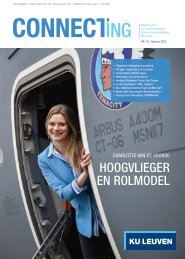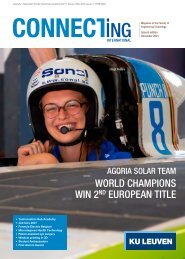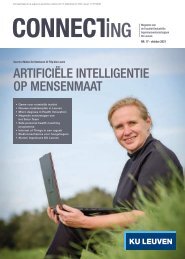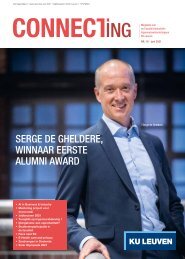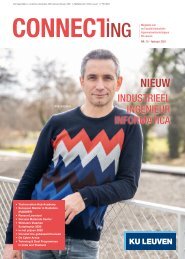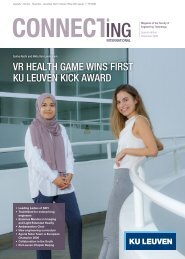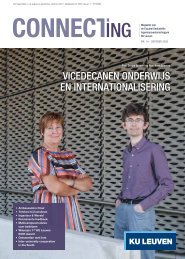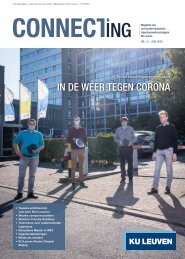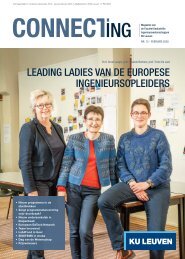ConnectING 19 juni 2022
Create successful ePaper yourself
Turn your PDF publications into a flip-book with our unique Google optimized e-Paper software.
NIEUWS UIT DE FACULTEIT<br />
FACULTY LAUNCHES<br />
NEW INTERNATIONAL<br />
POLICY PLAN<br />
The Faculty of Engineering Technology has invested resources and staff in developing an<br />
international strategic plan from its founding onwards. The previous five-year international<br />
strategic plan 2016-2021 was under review in the middle of a pandemic situation with<br />
international collaboration almost reduced to zero. Nevertheless, the Vice-dean for<br />
International Affairs, Professor Koen Eneman, and his team did not hesitate to renew the<br />
international engagement. Together with the Faculty Council for International Policy (FCIP)<br />
he developed a new vision for the coming 5 years.<br />
The context for international relations has changed, so our<br />
faculty approach and strategy are facing up to the new<br />
challenges and opportunities. The pandemic situation of<br />
the past two years has yielded some important international<br />
insights: digitalisation is here to stay in all fields of international<br />
collaboration, new formats for mobility are proliferating, and<br />
multiculturality and international competences are at the forefront<br />
of the learning outcomes of our study programmes.<br />
The new policy plan builds upon the realisations of the previous<br />
one and on the international mission statement that was adopted<br />
in 2015. The international activities in our faculty are geared<br />
towards four levels: students, staff, the organization as a whole<br />
and our role in society. The basic principle is that inter -<br />
nationalisation is a transversal action, which permeates all<br />
activities in education, research and services in the faculty.<br />
Internationalisation is not a goal, but a means to higher quality in<br />
each on each of these four levels.<br />
Motor of innovation<br />
The international mission statement starts from the assumption<br />
that our graduate engineers can function well in an intercultural<br />
environment. Professors and staff are coaching the students<br />
actively and work in an international context whereby inter -<br />
nationalisation is a motor for innovation in education and research.<br />
The faculty creates the necessary framework to allow these<br />
international activities to develop. It facilitates international<br />
activities by a specific human resource policy, by a strategic<br />
partner policy, the necessary services, and financial means.<br />
The strategic targets for students for the period up to 2025<br />
focus on developing intercultural competences for our graduate<br />
students. All students graduating in Engineering Technology must<br />
be able to function in an international and intercultural context.<br />
The post-covid era urges us to think of new ways of achieving<br />
these targets such as blended and virtual mobility, COIL<br />
(Collaborative Online International Learning), international student<br />
challenges etc. In this respect several concrete actions were set<br />
up such as participation in the UNA EUROPA student hackathon<br />
(July 2021) or the blended intensive programme “Sustainable<br />
energy in an IoT world” (March <strong>2022</strong>).<br />
Partner universities<br />
Another strategic choice lies in the increase of the faculty’s<br />
English-taught course offering at Master level (in addition to the<br />
unique English-taught ‘Bachelor of Engineering Technology’).<br />
At the moment, our faculty boasts 8 master’s programmes and<br />
3 advanced master’s programmes in English. A new working<br />
group on international recruitment, founded by the FCIP, is taking<br />
concrete actions for these study programmes, such as an online<br />
recruitment evening.<br />
The new policy plan furthermore includes actions geared towards<br />
staff, with specific attention to support for the integration of our<br />
increasing group of international staff. An online networking event<br />
to address questions from our international staff and doctoral<br />
students in May 2021 proved to be very successful.<br />
International collaboration builds upon a strong network of<br />
international partner universities and there also the faculty is<br />
making some important choices. The international partner plan<br />
has been reviewed and updated with an increased attention for<br />
the development of several strategic partnerships. The faculty’s<br />
educational programme committees (POCs) have been involved<br />
in a discussion to work towards an appropriate partner policy,<br />
both for EU and non-EU partners. The ongoing operation in the<br />
POCs will result in a pilot project for course package semesters<br />
later in <strong>2022</strong>.<br />
6




